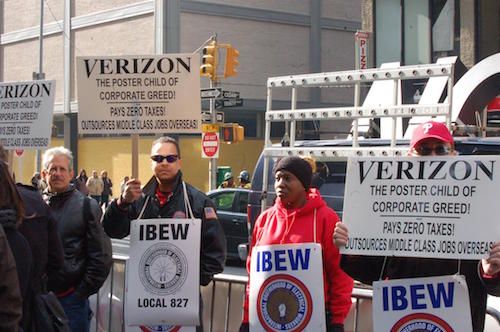As of 6 a.m. April 13, nearly 40,000 men and women employed by Verizon went on strike after months of bargaining between the company and members of the IBEW and the Communications Workers of America failed to produce an agreement.
The wireline installation and repair technicians, call center operators and clerical workers from New England to Virginia had been engaged in negotiations for nearly a year and working without contracts since they expired last August. Bargaining has so far been unproductive, with the company in many cases refusing to consider union proposals.

|
| Members from East Windsor, N.J., Local 827 demonstrated in 2011 during a two-week strike at Verizon.
|
“No one wants to go on strike,” said IBEW International President Lonnie R. Stephenson, “but Verizon—this immensely profitable company—is putting the squeeze on hard-working men and women who just want to come to work, do their jobs and be treated fairly.”
Verizon has posted profits of $1.8 billion per month so far this year, and $39 billion over the last three years, all while the company is seeking draconian cuts to employee pensions, health care, job security and benefits for workers injured on the job.
All over New England and the mid-Atlantic region, Verizon has been shrinking and closing call centers, outsourcing work to other areas or overseas, forcing employees make the impossible choice to quit or spend extra hours away from their families each day commuting to new work locations.
Already, some technicians have been forced to travel away from home for weeks at a time thanks to a severe worker shortage at the company. Now, Verizon is demanding even more sacrifices, attempting to require techs to spend as many as four months away from home and families if deemed necessary.
For Cranston, R.I., Local 2323 member Justin Draper, that sort of time away from home would be devastating. The 18-year Verizon splice service technician is a single father of two children, aged 12 and 8, and he depends on being able to drop the kids off at school and pick them up after his shift. “If Verizon tried to send me away for weeks or even months at a time, I’d have to look for another job,” he said. “Being away from my kids just simply isn’t an option for my family.”
The nearly 10,000 IBEW members affected are located primarily in Massachusetts, Rhode Island, upstate New York, New Jersey and portions of neighboring states, and CWA’s 29,000 members at Verizon cover the New York, Philadelphia, Baltimore and Washington, D.C. metropolitan areas as well as other locations from New York to Virginia. Also included in negotiations are 80,000 Verizon retirees, whose monthly health care costs are set to rise substantially if the company’s proposals take effect.
“This sort of corporate greed flies in the face of our values as hard-working Americans,” said Myles Calvey, chairman of IBEW System Council T-6 in New England and business manager of Boston Local 2222. “Verizon’s actions amount to nothing more than union-busting, and we’re prepared to do whatever it takes to get a good, fair contract for people who depend on this work to take care of their families.”
Last month, 20 U.S. senators sent a letter to Verizon CEO Lowell McAdam urging him to “act as a responsible corporate citizen and negotiate a fair contract with the employees who make your company’s success possible.”
Verizon’s customers, too, have paid the price for Verizon’s unwillingness to invest in critical infrastructure.
“For years we’ve been encouraging Verizon to continue the build-out of high-speed FiOS internet and television service to communities up and down the East Coast,” said Broadcasting and Telecommunications Department Director Martha Pultar. “It’s good for employees. It’s good for customers. It’s good for the company. People out there are begging for this service, and we’re going to keep fighting for broadband build-out in the entire Verizon footprint.”
“Verizon simply isn’t willing to accept any additional cost to the company,” said East Windsor, N.J., Local 827 Business Manager Bob Speer. “Whether it’s paying for the infrastructure upgrades they’ve been promising for years or taking care of the working people who keep the company running, these people only care about their Wall Street share price and their fat executive pay packages.”
Already, IBEW and CWA members, who are bargaining jointly with Verizon, offered the company hundreds of millions in health care cuts on top of the concessions they made in the three-year contract that expired in August.
“The problem is,” Speer said, “they can’t keep getting what they want without giving us anything that we need. It’s not a real negotiation when one side moves and the other digs their feet in.”
Representatives from both sides were scheduled to meet again Tuesday, hours before the 6 a.m. strike deadline the next morning.
“Obviously, we want to keep our people on the job and avoid this strike if we can,” Stephenson said. “But if Verizon stubbornly refuses to budge on important quality of life issues, we’ll have no choice. Forty-thousand people deserve to be able to see their families at night and 80,000 retirees have to be able to afford their health care. If Verizon cares more about their stock price than the people who come to work every day and generate billions in profits, then we’re just not seeing eye to eye.”